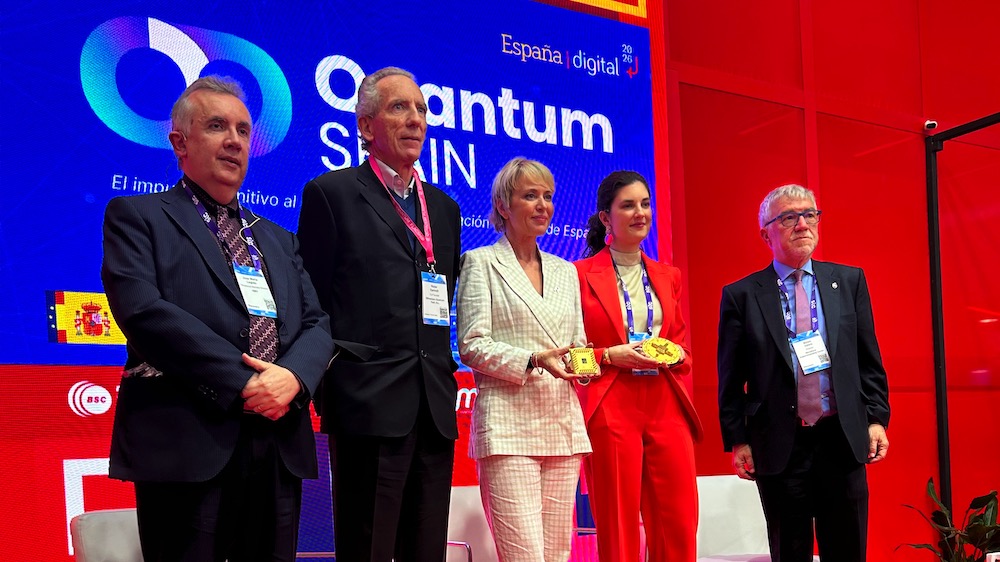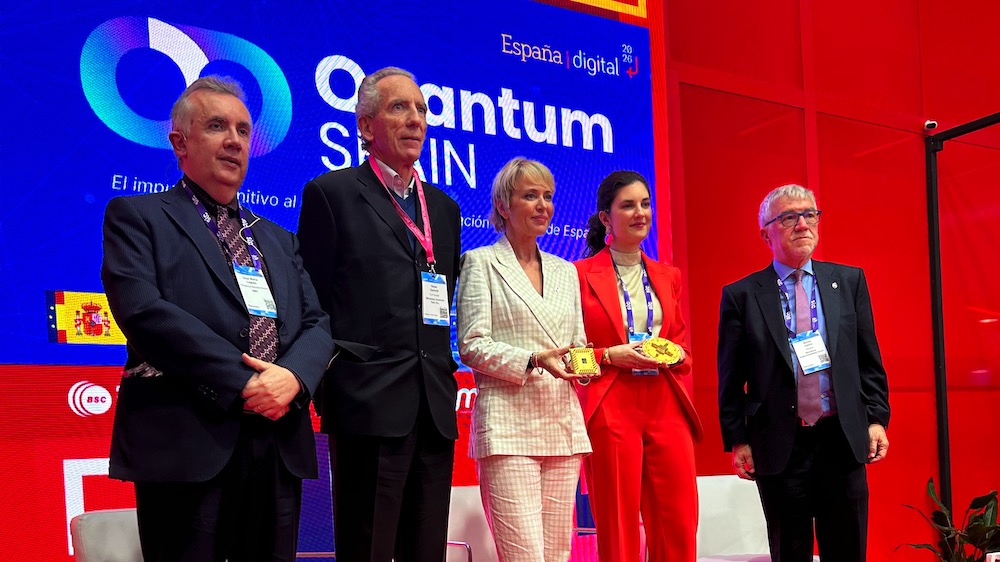
Quantum Spain Announcement at the Mobile World Congress 2023. Photo Qilimanjaro
The temporary joint venture (UTE) formed by the startup Qilimanjaro Quantum Tech and the Spanish technology company GMV, and led by Qilimanjaro’s CTO, Manel Martinez, has won the public tender opened last July 2022 to build the first quantum computer for public use in southern Europe. It will be installed at the Barcelona Supercomputing Center – Centro Nacional de Supercomputación (BSC-CNS) and will be integrated into the MareNostrum 5 supercomputer, the most powerful in Spain and among the most advanced in Europe and the world.
The development of this new infrastructure is part of the Quantum Spain initiative, promoted by the Ministry of Economic Affairs and Digital Transformation through the Secretary of State for Digitalisation and Artificial Intelligence (SEDIA) and coordinated by the BSC. The initiative, financed with Next Generation funds from the European Commission’s Recovery Plan for Europe, is part of the España Digital 2026 programme and the National Artificial Intelligence Strategy (ENIA).
This announcement was made this Monday at the Spain Pavilion located at the Mobile World Congress 2023 in Barcelona, in an event attended by the Secretary of State for Digitalisation and Artificial Intelligence, Carme Artigas, the director of the BSC, Mateo Valero, as well as representatives of Qilimanjaro, GMV and Quantum Spain.
The first Spanish quantum computer will be based on European technology and will be installed at the BSC in 2023, integrated in the new MareNostrum 5 supercomputer, which is currently being installed and will be operational next July. MareNostrum 5 will advance multiple academic applications and will be a further step towards exascale capabilities, the next frontier of supercomputing.
The integration of the new quantum computer into MareNostrum 5 will have the potential to significantly increase the impact of research and innovation by enabling solutions that complement the capabilities of existing supercomputers. The new infrastructure will be available to the research community, companies and public organisations, thus strengthening technological and industrial development in Spain and the creation of highly qualified jobs.
“The installation of this new computer that will integrate quantum computing with the MareNostrum 5 reinforces the BSC’s role as one of the leaders in supercomputing in Europe. It will allow us to move forward by adding new capabilities to the Red Española de Supercomputación and, above all, it allows us to continue contributing to the European strategy of digital sovereignty, as we are already doing with the European chip project,” said Mateo Valero, director of the BSC.
The installation and commissioning of the quantum computer is fundamental for the deployment of the Quantum Spain initiative, whose main objective is to create a solid quantum computing ecosystem in Spain, taking advantage of and promoting the talent of local researchers who are experts in this technology.
“Thanks to this project, Spain will have a public space with an emerging technology and will be aligned with similar European and global proposals. We want to promote the use of this technology in a transversal way, targeting both researchers and companies,” said Alba Cervera, BSC researcher and coordinator of Quantum Spain.
Qilimanjaro is one of the five startups worldwide, the only Spanish one, with the potential to influence the quantum computing industry, according to the StartUs Insights 2022 report. Its goal is to develop the next generation of quantum computers with easy-to-use cloud access to effectively tackle complex optimisation problems in sectors such as logistics, finance, and energy, among others, as well as the simulation of physical and chemical processes, which are very present in the pharmaceutical and materials research industries.
“The quantum computer that we provide to the Quantum Spain project allows us to extend the computing capabilities of the Red Española de Supercomputación to the new quantum computing paradigm, constituting a pioneering example in Europe of hybrid supercomputing and quantum computing. We are proud to implement this innovative system based purely on Spanish and European technology, and we hope that it will position us at scientific, technological and business level at the forefront internationally in this emerging field with clear disruptive potential,” said Victor Canivell, co-founder and CBO of Qilimanjaro.
In addition to the quantum computer, Qilimanjaro will be in charge of characterising and supplying quantum chips based on superconducting cubic technology, and their corresponding access and control software, as well as their installation and maintenance. The first quantum chip will be available in the second quarter of 2023 at the Qilimanjaro facilities, while the new quantum computing infrastructure is expected to be installed at the BSC in the third quarter of 2023 to complement the new MareNostrum 5.
“For the joint venture formed by Qilimanjaro and GMV, the construction and commissioning of the two units of the quantum computer that we will install at the BSC is a technological challenge of the first order, which we face with the commitment that this project will be a complete success and will provide the right platform to decisively boost the development of quantum computing in Spain,” says Manel Martinez, technical leader of the joint venture.
GMV is a Spanish technology group founded in 1984, privately owned and with an important international presence, with a staff of 3,000 professionals in 12 countries. The company’s growth strategy is based on continuous innovation, devoting 5% of its turnover to R+D+i. In this initiative, GMV complements Qilimanjaro’s quantum technology by taking charge of the conventional systems and network infrastructure needed to operate the quantum computer.
“GMV’s commitment in this pioneering project in Spain adds to our important commitment in the field of quantum computing, where we are already leading the project Misiones Grandes Empresas CUCO of the CDTI for the business development of the use of quantum computing, in which we already collaborate with Qilimanjaro, and which we are now extending jointly to the context of excellence in the academic world”, says José María Legido, director of GMV’s international area of Secure e-Solutions.
The development of this new infrastructure is part of the Quantum Spain initiative, promoted by the Ministry of Economic Affairs and Digital Transformation through the Secretary of State for Digitalisation and Artificial Intelligence (SEDIA) and coordinated by the BSC. The initiative, financed with Next Generation funds from the European Commission’s Recovery Plan for Europe, is part of the España Digital 2026 programme and the National Artificial Intelligence Strategy (ENIA).
This announcement was made this Monday at the Spain Pavilion located at the Mobile World Congress 2023 in Barcelona, in an event attended by the Secretary of State for Digitalisation and Artificial Intelligence, Carme Artigas, the director of the BSC, Mateo Valero, as well as representatives of Qilimanjaro, GMV and Quantum Spain.
The first Spanish quantum computer will be based on European technology and will be installed at the BSC in 2023, integrated in the new MareNostrum 5 supercomputer, which is currently being installed and will be operational next July. MareNostrum 5 will advance multiple academic applications and will be a further step towards exascale capabilities, the next frontier of supercomputing.
The integration of the new quantum computer into MareNostrum 5 will have the potential to significantly increase the impact of research and innovation by enabling solutions that complement the capabilities of existing supercomputers. The new infrastructure will be available to the research community, companies and public organisations, thus strengthening technological and industrial development in Spain and the creation of highly qualified jobs.
“The installation of this new computer that will integrate quantum computing with the MareNostrum 5 reinforces the BSC’s role as one of the leaders in supercomputing in Europe. It will allow us to move forward by adding new capabilities to the Red Española de Supercomputación and, above all, it allows us to continue contributing to the European strategy of digital sovereignty, as we are already doing with the European chip project,” said Mateo Valero, director of the BSC.
The installation and commissioning of the quantum computer is fundamental for the deployment of the Quantum Spain initiative, whose main objective is to create a solid quantum computing ecosystem in Spain, taking advantage of and promoting the talent of local researchers who are experts in this technology.
“Thanks to this project, Spain will have a public space with an emerging technology and will be aligned with similar European and global proposals. We want to promote the use of this technology in a transversal way, targeting both researchers and companies,” said Alba Cervera, BSC researcher and coordinator of Quantum Spain.
Qilimanjaro is one of the five startups worldwide, the only Spanish one, with the potential to influence the quantum computing industry, according to the StartUs Insights 2022 report. Its goal is to develop the next generation of quantum computers with easy-to-use cloud access to effectively tackle complex optimisation problems in sectors such as logistics, finance, and energy, among others, as well as the simulation of physical and chemical processes, which are very present in the pharmaceutical and materials research industries.
“The quantum computer that we provide to the Quantum Spain project allows us to extend the computing capabilities of the Red Española de Supercomputación to the new quantum computing paradigm, constituting a pioneering example in Europe of hybrid supercomputing and quantum computing. We are proud to implement this innovative system based purely on Spanish and European technology, and we hope that it will position us at scientific, technological and business level at the forefront internationally in this emerging field with clear disruptive potential,” said Victor Canivell, co-founder and CBO of Qilimanjaro.
In addition to the quantum computer, Qilimanjaro will be in charge of characterising and supplying quantum chips based on superconducting cubic technology, and their corresponding access and control software, as well as their installation and maintenance. The first quantum chip will be available in the second quarter of 2023 at the Qilimanjaro facilities, while the new quantum computing infrastructure is expected to be installed at the BSC in the third quarter of 2023 to complement the new MareNostrum 5.
“For the joint venture formed by Qilimanjaro and GMV, the construction and commissioning of the two units of the quantum computer that we will install at the BSC is a technological challenge of the first order, which we face with the commitment that this project will be a complete success and will provide the right platform to decisively boost the development of quantum computing in Spain,” says Manel Martinez, technical leader of the joint venture.
GMV is a Spanish technology group founded in 1984, privately owned and with an important international presence, with a staff of 3,000 professionals in 12 countries. The company’s growth strategy is based on continuous innovation, devoting 5% of its turnover to R+D+i. In this initiative, GMV complements Qilimanjaro’s quantum technology by taking charge of the conventional systems and network infrastructure needed to operate the quantum computer.
“GMV’s commitment in this pioneering project in Spain adds to our important commitment in the field of quantum computing, where we are already leading the project Misiones Grandes Empresas CUCO of the CDTI for the business development of the use of quantum computing, in which we already collaborate with Qilimanjaro, and which we are now extending jointly to the context of excellence in the academic world”, says José María Legido, director of GMV’s international area of Secure e-Solutions.




 IonQ Achieves Industry Leading Performance on Next Generation Barium Qubits
IonQ Achieves Industry Leading Performance on Next Generation Barium Qubits